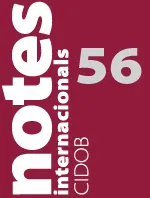Pakistan: The Status Quo Prevails, or Time for Something Completely Different? Part Two: Radicalism, Militancy & the Civil-Military Divide

Notes internacionals CIDOB, núm. 56
- Radicalism, militancy and the civil-military divide constitute critical challenges facing Pakistan’s rulers and have linkages to both governance and economic issues.
- Security and geo-strategic challenges include that of the obvious links between (violent) radicalisation and militancy. However, there is also a more insidious form - the radicalisation of mindsets.
- With the liberalisation of press laws, on the one hand, freedom of expression has flourished. However, the visual media is not well-versed in the ethics of criticism, and extremist, ultra-nationalist and often irresponsible views are routinely aired on private television channels.
- The failure of political parties to develop a counter-ideology to combat mindsets of extremism has the consequence that, because of the lack of a better alternative, people take refuge in a more tangible, rightist, religious ideology, which is fuelled by a growing anti-US sentiment.
- Some see “the crisis of conscience and integrity of the ruling elite – civilian and military” as being rooted in a failure to see serving the people rather than fostering self-interest, which is regarded as the single most salient challenge for Pakistan.
- Overall, the jury is still out on how these all-too-real challenges will play out on the ground. Possible scenarios range from the radical - state collapse, with armed ideological separatist tribal and sectarian non-state actors taking power; to the liberal-constitutional – with the country tentatively moving towards some type of liberal and constitutional democracy; to the “status quo ante” whereby Pakistan would simply still go on “muddling through and patching up” critical issues, as has been the pattern of the past six decades.
(...)